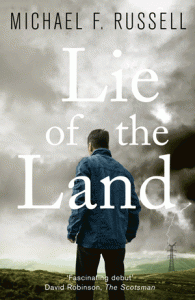Lie of the Land
 If you like post-apocalyptic novels, then this is the book for you. If you like them very gory and brutal, then this is not the book for you.
If you like post-apocalyptic novels, then this is the book for you. If you like them very gory and brutal, then this is not the book for you.
Even the deaths are gentle. Russell himself said that, although he had a ‘‘fascination with Armageddon,’’ he ‘’wanted to devise one…based on human technology rather than something more conventional, and haphazard, such as asteroid strike or plague.’’ He comes up with a very original (and sinister) situation, in which a government, which is obsessed with security, (making “kit that was needed to keep people safe from themselves”) accidentally puts most of the population into a sleep from which they will never wake up. Only people in an area with no mobile phone signal are immune, such as the residents of the village in the Highlands where the novel is set.
As the author grew up on the Isle of Barra and now lives on Skye, he is well acquainted with the type of area he describes. He is also a journalist – deputy editor of the West Highland Free Press – as is Carl, the protagonist – and went to university in Glasgow, where Carl lived before the catastrophe. Russell is thus obeying the rule of writing about what he knows. In the process, he explores a “what if?” situation far more subtly than many post-apocalyptic novels.
Stuart Kelly, reviewing the novel in the Scotsman, mentioned a descent into anarchy but, even though there is no formal government, people do not sink into brutality as is typical in this type of story. The villagers, for the most part, make the best of a bad situation. There is corruption among the committee in charge of the food but no-one starves. There is a crime which may or may not be exceptionally serious and which has no legal system to deal with it but, overall, this is not a novel in which all the trappings of civilisation are discarded. It is more interesting than that.
For one thing, the catastrophic event is described not only in detail but in believable detail. However, the story plunges the reader straight into the middle, introducing the central character in a graveyard, in a condition which suggests he is not too far from joining the other inhabitants of the cemetery. Page one ends with the sentence ‘’the world was dead and he had helped kill it’’, which, of course, encourages the reader turn over to page two. For me, if a writer compels me to turn that first page, I will read to the end of the book.
The first section is entitled October and the next is (the previous) July, but there is no confusion in this backtracking. The novel is very easy to read and Russell employs a nice turn of phrase, such as describing oil lamps as “staining the blackness”. There is a very smudgy sort of light with oil lamps, of course, but this also implies that it is the blackness which is pure and is almost sullied by the light. Russell knows about darkness, of course, because the darkness in the Highlands is very different to that encountered in a city, where it is never truly dark.
Carl would have found it difficult to fit in to a remote village at the best of times but this situation is agony for him. He appears to be a very selfish character, taking food but not wanting to contribute anything or to face up to his responsibilities. The novel explores his struggle but does not neglect the lives of other characters, all of whom have their own particular struggles in addition to the communal one.
When Carl is rebuilding a broch, he decides that “order can be restored, a semblance of purpose” and this is what he finally achieves in his own life. The novel ends with some hope for the future, which makes it much more satisfying than most novels of this genre.
Mair Davies

Leave a Reply